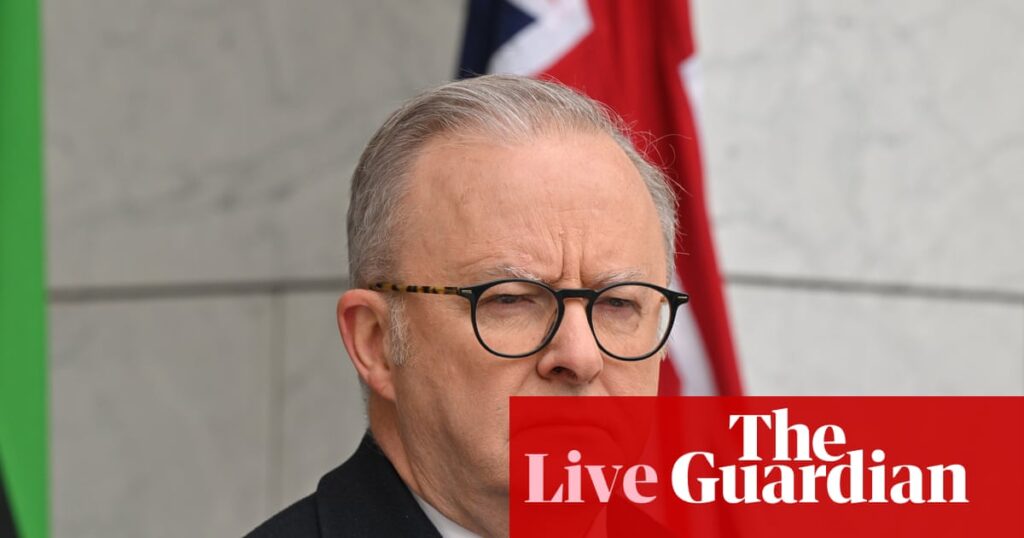
As the Australian Parliament convened for question time, the session was marked by the fervent chants of protesters demanding immediate sanctions against Israel. The demonstrators, positioned in the public gallery, disrupted proceedings with cries of “sanction Israel now,” prompting security to clear the area. This protest underscores the heightened tensions surrounding Australia’s foreign policy stance on Middle Eastern conflicts.
Meanwhile, the parliamentary session continued with a focus on domestic issues, notably the ongoing debate over the government’s health policies. Deputy Leader of the Opposition, Sussan Ley, challenged Prime Minister Anthony Albanese on the state of bulk-billing rates, citing figures from the Australian Institute of Health and Welfare. According to the data, Australians incurred over $166 million in out-of-pocket expenses for GP visits in May alone. Albanese defended his administration’s efforts, asserting that the government is committed to strengthening Medicare and increasing bulk-billing rates.
Protesters Demand Sanctions Amidst Political Tensions
The protest calling for sanctions against Israel comes at a time when international relations are under scrutiny. The demonstrators’ actions reflect a broader global discourse on the Israeli-Palestinian conflict, with various countries reconsidering their diplomatic positions. While the UK and France have taken steps towards recognizing Palestinian statehood, Australia’s approach remains cautious. Prime Minister Albanese has indicated that any recognition of Palestine would be contingent upon circumstances that advance the objective of a two-state solution.
In a related development, Shadow Defence Minister Angus Taylor commented on the humanitarian crisis in Gaza, describing it as “tragic.” However, he argued that recognizing Palestinian statehood prematurely would be “putting the cart before the horse,” emphasizing the need for Hamas to be removed from Gaza and for hostages to be released before any diplomatic recognition could proceed.
Honoring the 1980 Olympians: A Historical Reflection
Before the heated debates, the session opened with a poignant acknowledgment of the 1980 Olympians who competed under a neutral flag in Moscow, defying a government boycott. Prime Minister Albanese paid tribute to these athletes, recognizing both their achievements and the personal sacrifices they made during a politically tumultuous period. This acknowledgment serves as a reminder of the intersection between sports and politics, and the enduring impact of international conflicts on athletes.
Opposition Leader Sussan Ley also addressed the chamber, reflecting on the personal costs faced by athletes who chose not to compete in 1980. She emphasized that their decisions should not detract from the pride and respect owed to those who did participate, reinforcing the notion that sports can transcend political divides.
Economic Challenges and Policy Debates
On the economic front, Treasurer Jim Chalmers addressed concerns about Australia’s “softer” economic conditions, attributing them to high interest rates and global uncertainties. Recent inflation figures, which show a decline to 2.1% from 2.4% earlier this year, have sparked discussions about potential rate cuts by the Reserve Bank. Analysts, including Stephen Smith from Deloitte Access Economics, suggest that current interest rates may need to be adjusted to stimulate economic growth amid ongoing volatility.
In the Senate, debates over the Hecs bill highlighted divisions within the government and opposition. An amendment proposed by Senator Sarah Henderson to cap indexation at 3% was voted down, reflecting the complexities of addressing student debt amidst broader economic challenges.
Legal Battles and Political Implications
In legal news, billionaire Richard White’s lawyers are contesting a subpoena related to communications with Nathalie Matthews, the former partner of NSW MP Mark Latham. This legal battle is part of Latham’s defense against a Domestic Violence Order application, which includes serious allegations of intimidation and misconduct. The case is set to return to court in August, with significant implications for Latham’s political career.
As these events unfold, the Australian political landscape remains a dynamic arena of protest, policy, and legal challenges. The outcomes of these debates and legal proceedings will likely shape the nation’s domestic and international policies in the months to come.





